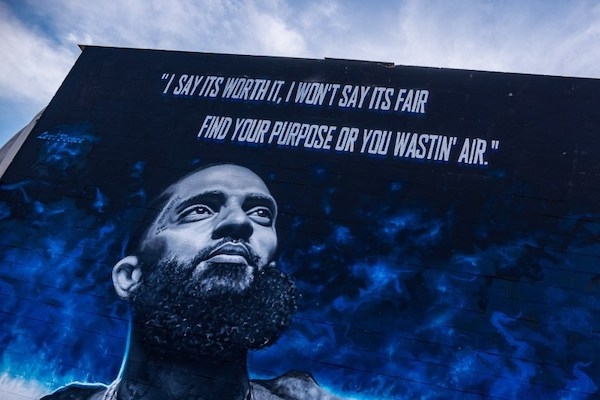This article by Dante Owens is a response to the New York Times article that came out over the summer, “Nipsey Hussle Was Hailed as a Peacemaker by the LAPD. He Was Also Their Focus in an Investigation.” As a former gang member Dante relates to the experience that no matter how you change and make efforts to leave a positive imprint, many will only see you as a gangster.
Photo Source: LATaco.com, Mural by CA artist @leviponce
I see the play from the police and the city of Los Angeles as they try to play their hand right with the death of Nipsey Hussle. On one hand, they hold him up as a community leader. As someone that added value to the neighborhood and the city as a whole. According to the NY Times article, “The mayor called Hussle ‘an artist who touched our city.’ The police chief hailed him as a peacemaker. The head of the police commission said he had plans to meet with Hussle to discuss ways to reduce gang violence.”
The L.A.P.D. gave the impression of being on the side of the people while being quiet about their investigation of his business, “which the city has not publicized,” involved pressuring “Hussle’s former landlords to evict the rapper and his associates.”
It’s obvious that they’re still convinced that Nipsey is nothing but a gang member who brings drugs and violence into the community. Thing is, the L.A.P.D. and the city were not ready for the reaction in the streets after Nipsey’s death.
How can they be against the people that pay taxes and their salaries when they are paid to perform in the community’s best interests?

Reading the article by NY Times journalist, Tim Arango, it’s obvious that they were threatened by Nipsey’s power within the community. About who owns what, using the gang member label as a reason to enforce laws against the people. About preventing people like Nipsey from making progress, from being able to be a productive member of his community, and even owning homes and businesses because of his former life. That leaves people who have a gang reputation having to move out of their community to have a second chance at life, leave the place called home.
The more the city and law enforcement use this gang label in the inner city the more they’ll be able to use B.S. laws to target low income communities; those in so-called gang-infested neighborhoods.
Deep down, my thoughts about this article, what the city’s been doing under the radar (before the article) while Nipsey in his position is doing the right thing within the law and following all the rules, then it shouldn’t matter what a person’s past is or what label society has put on that person.
“This seeming contradiction, of Hussle simultaneously being embraced by city leaders and being the focus of an investigation, reflects the divisions within the city’s law enforcement over how to deal with street gangs decades after Los Angeles became a byword for gang warfare in the 1980s and 1990s,” states journalist Arango.
It’s like I said in my last post, when one has lived as a gangster, even when there is evidence of leaving that life behind, many will always continue to see you with suspect and as a gang member. As a former member of the Compton Crips, a life I left many, many years ago, being doubted is hard to deal with.
The reason these city leaders have continued to go after Nipsey, who was making an effort to reduce gang violence and improve living conditions in his Compton community, is because they don’t really want shit to change. They want the cycle of gang violence and drugs to continue.
Trust and believe that until we become more conscious of these city leadership issues and contradictions the community as a whole will continue to suffer.
Related Links:
Nipsey Hussle Was Hailed as a Hero. But to California Officials, He Was Still a Gangster.
A young Nipsey Hussle remembered through old footage, captured by HJ Chong
Nipsey Hussle Was To Meet With LAPD To Discuss Ending Gang Violence

About Insight, Out
Insight, Out is a blog series by Dante Owens, an inmate at the Sterling Correctional Facility, with editorial and publishing assistance by Kim Owens. Insight, Out conveys Dante’s personal stories and experiences of his life inside prison in an effort to share them with the world outside. This editorial journey will also provide insights into changes being made and restorative residents programs taking place, some of which are led by Dante, within the Colorado’s correctional system that strive for rehabilitation and reducing recidivism. Dante Owens’ writings and opinions are his own and do not reflect or represent that of anyone other than himself.



